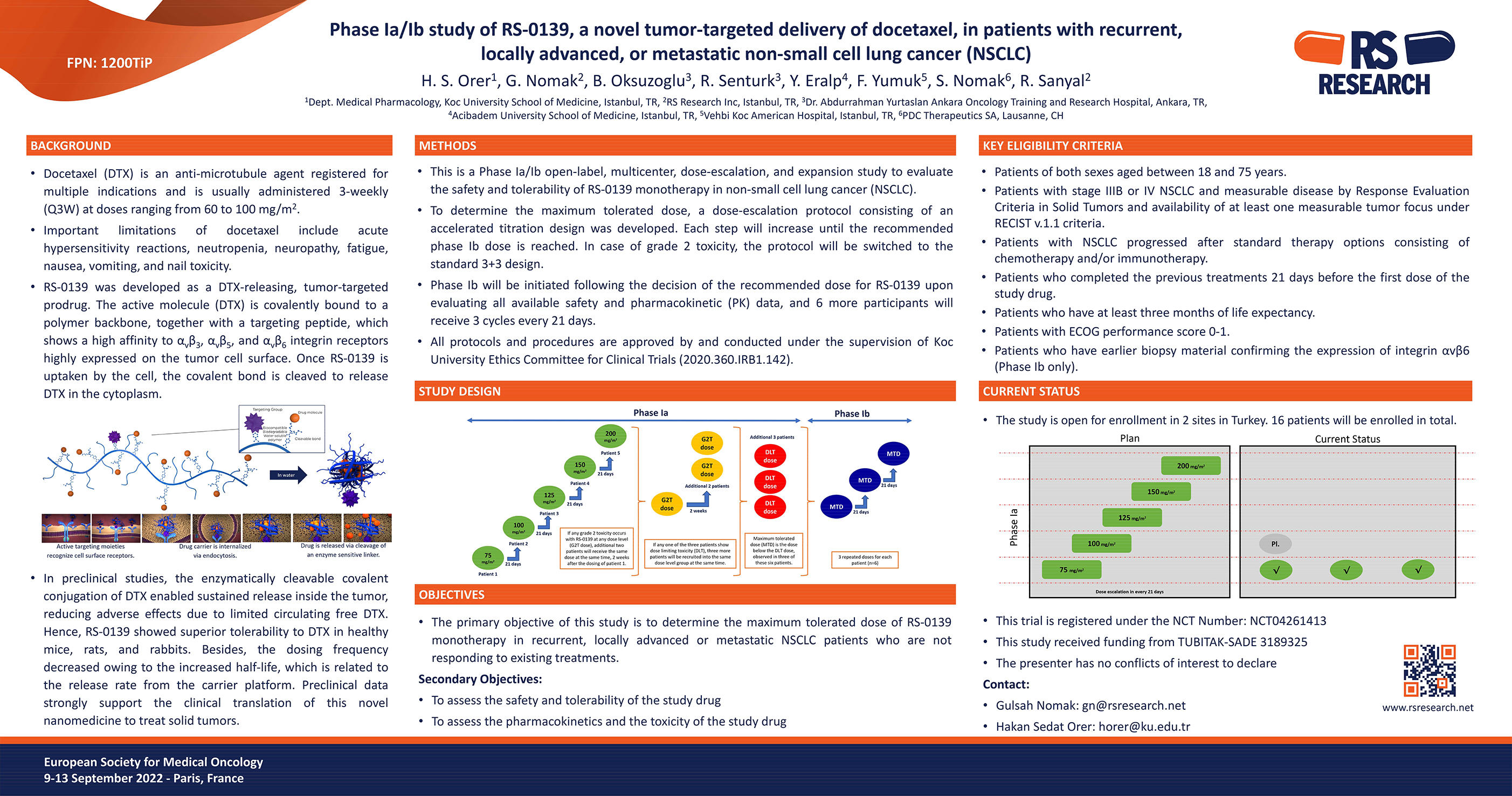Phase Ia/Ib study of RS-0139, a novel tumor-targeted delivery of docetaxel, in patients with recurrent, locally advanced, or metastatic non-small cell lung cancer (NSCLC)
ESMO 2022, Paris
Authors
H.S. Orer1, G. Nomak2, B.O. Oksuzoglu3, R.S. Senturk4, Y. Eralp5, F.P. Yumuk6, H.S. Nomak7, R. Sanyal8
Affiliations
1Medical Pharmacology, Koc University School of Medicine, Istanbul, Turkey
2Medical, RS Research, İstanbul Asya, Turkey
3Medical Oncology, University of Health Sciences Dr. Abdurrahman Yurtaslan Ankara Oncology Education and Research Hospital, Ankara, Turkey
4Phase 1 Clinical Trials Center, University of Health Sciences Dr. Abdurrahman Yurtaslan Ankara Oncology Training and Research Hospital, Ankara, Turkey
5Medical Oncology, Acibadem University Maslak Acibadem Hospital, Istanbul, Turkey
6Medical Oncology, Koc University School of Medicine, Istanbul, Turkey
7Mng, PDC Therapeutics, Lausanne, Switzerland
8Mng, RS Research, Istanbul, Turkey
Background
Docetaxel (DTX) is an anti-microtubule agent registered for multiple indications and is usually administered 3-weekly at doses of 60-100 mg/m2. Important limitations of DTX include acute hypersensitivity reactions, neutropenia, neuropathy, fatigue and nausea. RS-0139 is developed as a DTX-releasing, tumor-targeted prodrug. DTX is covalently bound to a polymer backbone, together with a targeting peptide, which shows high affinity to avb3, avb5 and avb6 integrin receptors highly expressed on tumor cell surface. Once RS-0139 is up-taken by the cell, the covalent bond is cleaved to release DTX in the cytoplasm. RS-0139 gains the investigational new drug status since DTX is covalently modified for the targeted treatment. The physical properties of RS-0139, pharmacokinetic profile and improved aqueous solubility may provide an advantage over the currently used taxanes. In preclinical studies, enzymatically cleavable covalent conjugation of DTX enabled sustained-release inside the tumor, reducing adverse effects due to limited circulating free DTX. Hence, RS-0139 showed superior tolerability than DTX in healthy animals. Besides, the dosing frequency decreased owing to the increased half-life. Preclinical data strongly support the clinical translation of this novel nanomedicine for the treatment of solid tumors.
Trial design
This is a phase Ia/Ib open-label, multicenter, dose-escalation and expansion study to evaluate the safety and tolerability of RS-0139 monotherapy in NSCLC. Patients who progressed after standard therapy are eligible for the study. In Phase Ia, patients receive RS-0139 (IV) at escalating doses (75-200 mg/m2). The protocol consists of an accelerated titration design until the recommended dose for Phase Ib is elicited and switched to standard 3+3 design in case of grade 2 toxicity. Phase Ib will be initiated following the determination of the recommended dose for RS-0139 upon evaluation of all available safety and PK data and 6 patients will receive 3 cycles in every 21 days. The primary endpoint is the determination of the MTD of RS-0139. The study is open for enrollment in 2 sites. Two of the planned 16 patients have been enrolled to date.
Citation
Annals of Oncology (2022) 33 (suppl_7): S448-S554. 10.1016/annonc/annonc1064

